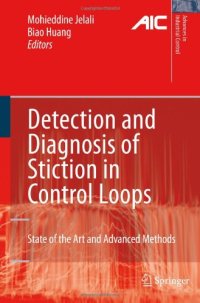
Ebook: Detection and Diagnosis of Stiction in Control Loops: State of the Art and Advanced Methods
- Tags: Control, Industrial Chemistry/Chemical Engineering, Industrial and Production Engineering, Engineering Fluid Dynamics, Automotive Engineering
- Series: Advances in Industrial Control
- Year: 2010
- Publisher: Springer-Verlag London
- Edition: 1
- Language: English
- pdf
The presence of non-linearities, such as stiction and deadband, places limits on the performance of control valves. Indeed, in the process industries, stiction is the most common valve problem, and over the last decade numerous different techniques for overcoming it have been proposed.
Detection and Diagnosis of Stiction in Control Loops represents a comprehensive presentation of these methods, including their principles, assumptions, strengths and drawbacks. Guidelines and working procedures are provided for the implementation of each method and MATLAB®-based software can be downloaded from www.ualberta.ca/~bhuang/stiction-book enabling readers to apply the methods to their own data. Methods for the limitation of stiction effects are proposed within the general context of:
• oscillation detection in control loops;
• stiction detection and diagnosis; and
• stiction quantification and diagnosis of multiple faults.
The state-of-the-art algorithms presented in this book are demonstrated and compared in industrial case studies of diverse origin – chemicals, building, mining, pulp and paper, mineral and metal processing. Industry-based engineers will find the book to be valuable guidance in increasing the performance of their control loops while academic researchers and graduate students interested in control performance and fault detection will discover a wealth of static-friction-related research and useful algorithms.
The presence of non-linearities, such as stiction and deadband, places limits on the performance of control valves. Indeed, in the process industries, stiction is the most common valve problem, and over the last decade numerous different techniques for overcoming it have been proposed.
Detection and Diagnosis of Stiction in Control Loops represents a comprehensive presentation of these methods, including their principles, assumptions, strengths and drawbacks. Guidelines and working procedures are provided for the implementation of each method and MATLAB®-based software can be downloaded from www.ualberta.ca/~bhuang/stiction-book enabling readers to apply the methods to their own data. Methods for the limitation of stiction effects are proposed within the general context of: oscillation detection in control loops, stiction detection diagnosis; , stiction quantification and diagnosis of multiple faults.
The state-of-the-art algorithms presented in this book are demonstrated and compared in industrial case studies of diverse origin – chemicals, building, mining, pulp and paper, mineral and metal processing. Industry-based engineers will find the book to be valuable guidance in increasing the performance of their control loops while academic researchers and graduate students interested in control performance and fault detection will discover a wealth of static-friction-related research and useful algorithms.